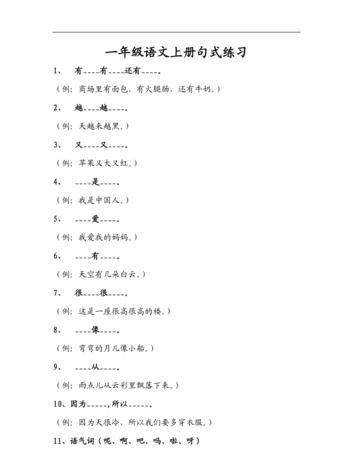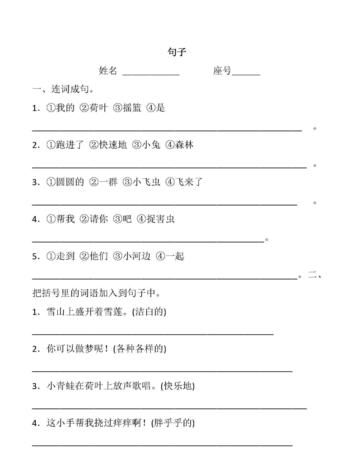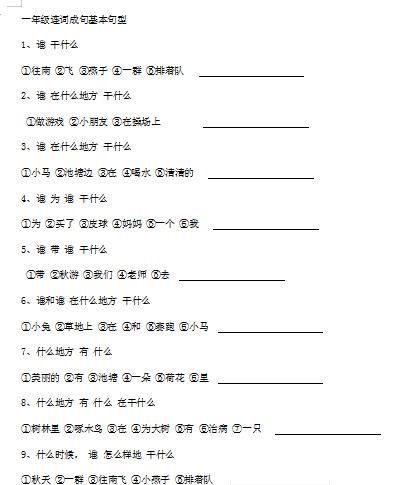本文目录
初一英语下册M6重点单词短语句型
【句型】
一、 How do you like ... ?
〔句型介绍〕 用来询问对某人 / 物喜欢到什么程度,意为\"你觉得......怎么样\",常以I like ... a lot / a great deal / very much. 回答。
-How do you like your hometown? 你觉得你家乡怎么样?
-I like it very much. 我很喜欢。
〔句式比较〕 What do you think of ... ?= How do you think about ... ?= How do you find / enjoy ... ?不知道对方是否喜欢某人 / 物而加以询问,回答时应对此人 / 物作出评价。
-What do you think of / How do you think about the book? 你认为这本书怎么样?
-Very interesting. 很有趣。
-How do you find / enjoy this show ? 你认为这个节目怎么样?
-Dull. 枯燥。 ( find 找到,寻得;发现;碰上)
〔特别提醒〕 注意这些句式的不同含义。
二、 What do you have for ... ?
〔句型介绍〕 用来询问某人一日三餐吃什么, for后面应接一日三餐名词。
-What do you have for lunch? 你中午吃什么?
-I usually have rice. 我通常吃米饭。
〔句式比较〕 What do you eat for ... ?与What do you have for ... ?用法相同。
-What do you eat for your supper? 晚饭你吃什么?
-Noodles. 面条。
〔特别提醒〕 因句中have为实义动词,所以该句型不能改为What have you for ...?
三、What do you do ... ?
〔句型介绍〕 该句询问对方职业,意为\"你是干什么的?\",人称可随语境而变化,第一个do为助动词,单复数随主语的变化而变化,第二个do为实义动词。
-What do you do? 你是干什么的?
-I'm a worker. 我是一个工人。
〔句式比较〕 What are you? 你是干什么的?what表职业, be动词单复数随主语的变化而变化。
What is he? 他是干什么的?
-He is a student. 他是一个学生。
〔特别提醒〕 注意what的不同含义。
四、 How do you go to ... ?
〔句型介绍〕 该句为询问对方交通方式的用语,常用by, in, on接交通工具的名词作回答。
-How do you go to school? 你怎么去上学?
-By bus. 乘公共汽车。
〔句式比较〕 How do you come to ... ?的用法与How do you go to ...?句型相似。
-How do you come to our school? 你怎么来到我们学校的?
-In a taxi. 打的来的。
〔特别提醒〕 回答这两个句型时, by后面应接交通工具名词原形,而in, on后面根据需要可用不定冠词或数词修饰交通工具名词。
五、 What's your favourite ... ?
〔句型介绍〕 该句用来询问对方最喜欢什么,相当于What ... do you like best?
-What\'s your favourite subject? 你最喜欢什么学科?
-English. 英语。
-What colour do you like best? 你最喜欢什么颜色? (best 最好的) (good和well的最高级)
-Red. 红色。
〔句式比较〕 Which ... do you like best? 你最喜欢哪一个......?
-Which book do you like best? 你最喜欢哪一本书?
-This one. 这一本。
〔特别提醒〕关注这些句型含义和结构的微小区别。
六、 What's wrong with ... ?
〔句型介绍〕 该句询问某人或某物有何毛病,意为\"......怎么啦?\" wrong为形容词,前面不加定冠词。
What's wrong with you? You don\'t look well. 你怎么啦?脸色看起来不好。
〔句式比较〕 What's the matter / trouble with ... ?含义和用法与What's wrong with ... ?相同, matter和trouble为名词,前面应加定冠词。
-What's the trouble / matter with your bike? 你的自行车怎么啦?
-It can't run fast. 它走不快。
〔特别提醒〕 注意这些句型中连系动词后面有无冠词。
1.(1)be后的动词常用ing形式;(2)介词后面常用ing形式,如:be worried about doing sth.,be excited about doing sth.,be good/bad at doing sth.,be interested in doing sth.等;另外,有些动词后面的动词一定要用ing形式,如:enjoy,finish,practise,miss等。
2.一部分动词后面要搭配to do结构,如:ask sb.to do sth.,tell sb.to do sth.等;另外,to do还能表目的,如:She gives me a book to read.
3.(1)助动词后常用原形(现在完成时和过去完成时除外),如:He didn't call me./We won't go there by car.(2)祈使句中用动词原形,如:Open the door, please./Don't feed the animals.
助动词be, have, do, shall, will, should, would
1.S(主) + Vi(不及物动词)(谓)
Time flies.
1) S + V + adverbial(状语)
Birds sing beautifully.
2) S + Vi+ prep Phrase(介词短语)
He went on holiday.
3) S + Vi+ Infinitive (不定式)
We stopped to have a rest.
4) S + Vi+ Participle (分词)
I'll go swimming.
2. S (主)+ Vt (及物动词)(谓)+ O(宾)
We like English.
1) S + VT + N/Pron
I like music.
I like her.
2) S + VT + infinitive(不定式)
I want to help him.
常用于这句型的动词有:attempt, dare, decide, desire, expect, hope, intend, learn, need, offer, pretend, promise, propose, purpose, refuse, want, wish等。
3) S + VT + Wh-Word + Infinitive
I don't know what to do.
常用于这句型的动词有:ask, consider, decide, discover, explain, find out, forget, guess, inquire, know, learn, observe, remember, see, settle, tell, think, understand, wonder等。
4) S + VT + Gerund
I enjoy living here.
常用于这句型的动词有:admit, advise, avoid, consider, defend, enjoy, excuse, finish, forbid, mind, miss, practise, risk, suggest, give up, can't help等。
5) S + VT + That-clause
I don't think (that) he is right.
常用于这句型的动词有:Admit, believe, command, confess, declare, demand, deny, doubt, expect, explain, feel(觉得), hear(听说), hope, imagine, intend, know, mean, mind(当心), notice, propose, request, report, say, see(看出),show, suggest, suppose, think, understand, wish, wonder(觉得奇怪)。
3. S (主)+ V(谓)(lv)( 系动词)+ P(表)
We are Chinese.
除了be 系动词外,还有一些动词也可以用作系动词,1)表感官的动词,feel, smell, taste, sound, look, appear, seem 等。2) 表转变变化的动词,become, get, grow, turn, go,等。 3)表延续的动词 remain, keep, seem, hold, stay, rest等。4)表瞬时的动词 come, fall, set, cut, occur等 5)其他动词 eat, lie, prove, ring, run, shine, sit, stand, continue, hang等。
1) S + Lv + N/Pron(名词/代词)
He is a boy.
This is mine.
2) S + Lv + Adj(形容词)
She is beautiful.
3) S + Lv + Adv (副词)
Class is over.
4) S + Lv + Prep Phrase
He is in good health.
5) S + Lv + Participle(分词)
He is excited.
The film is interesting.
4. S (主)+ VT (谓)+ In O(间接 宾) + D O(直接 宾)
I give you help.
1) S + VT + N/Pron + N
I sent him a book.
I bought May a book.
2) S + VT + N/Pron + To/for-phrase
He sent a book to me.
He bought a coat for me.
间接宾语前需要加to 的常用动词有:allow, bring, deny, do(带来), give, grant, hand, leave, lend, offer, owe, pass, pay, permit, promise, read, refuse, render, restore, sell, send, show, teach, tell wish, write等。
间接宾语前需要加for 的常用动词有:bring, buy, cash, choose, fetch, get, leave, make, order, paint, play(演奏),save, sing, spare等。
5. S (主)+ VT(谓)+ O(宾) + O C(宾补)
I make you clear.
1) S + VT + N/Pron + N
We named our baby Tom.
常用于这句型的动词有:appoint, call, choose, elect, entitle, find, make, name, nominate(命名)。
2) S + VT + N/Pron + Adj
He painted the wall white.
常用于这句型的动词有:beat, boil, cut, drive, find, get, hold, keep, leave, like, make, paint, see, set, turn, want, wash, wipe, wish等。
3) S + VT + N/Pron + Prep Phrase
She always keeps everything in good order.
4) S + VT + N/Pron + Infinitive
I wish you to stay.
I made him work
常用于这句型的动词有:a)不定式带to的词:advice, allow, ask, beg, cause, choose, command, decide, encourage, expect, force, get, hate, invite, know, leave, like, love, order, permit, persuade, prefer, remain, request, teach, tell, want, warn, wish等。b)不定式不带to的词:feel, have, hear, know, let, listen to, look at, make, notice, see, watch等。
5) S + VT + N/Pron + Participle (分词)
I heard my name called.
I feel something moving.
常用于这句型的动词有:catch, feel, find, get, have, hear, imagine, keep, leave, listen to, look at, notice, observe, perceive, see, set, smell, start, watch等。
6) S + VT + N/Pron + Wh-word + Infinitive
He show me how to do it.
常用于这句型的动词有:advise, ask, inform, show, teach, tell等。
7) S + VT + N/Pron + That-clause
He told me that the film was great.
常用于这句型的动词有:assure, inform, promise, remind, teach, tell, warm等。
8) S + VT + N/Pron + Wh-Clause
He asked me what he should do.
常用于这句型的动词有:Advise, ask, inform, show, teach, tell.
【短语】
初一英语词组汇编
Unit 1-8
坐下 sit down
祝你早安 Good morning to you.
欢迎到…… welcome to…
在一年级3班 in Class 3, Grade 1
用英语 in English
一辆中国小汽车 a Chinese car
一辆英国小汽车 an English car
多大 how old
在校 at school
在家 at home
我不知道。 I don’t know
进来 come in
值日 be on duty
看起来很像 look the same
在那边 over there
照料、照看 look after
请走这边 This way, please.
在同一排 in the same row
看…… look at…
去上班 go to work
Unit 9-16
去同一学校 go to the same school
在不同的班级 in different classes
坐下 have a seat/ sit down
看起来像…… look like…
在课桌上 on the desk
在椅子后面 behind the chair
在墙上 on the wall
在床下 under the bed
在门附近 near the door
一幅教室的画 a picture of a classroom
在画中 in the picture
在讲台上 on the teacher’s desk
一幅中国地图 a map of China
特别行政区 an SAR
在包里 in the bag
在鱼缸上 on the fish bowl
在门边 at the door
拿球 get the ball
什么颜色 what colour
小游戏房 a small playhouse
在一棵大树上 in / on a big tree
看一看 have a look
让我看看/ 让我想想 let me see
就是它。 That’s it.
在空中 in the sky
在河面上 on the river
在地板上 on the floor
快来 come on
在小山上 on the hill
浅蓝色 light blue
穿红色外套的 in the red coat / in red
在格林夫人的晒衣绳上 on Mr Green’s clothes line
深褐色 dark brown
穿上 put on
把某物给某人 give sth to sb
起床 get up
去上学 go to school
和某人一起去 go with sb
课间休息时间 time for break
上课时间 time for class
吃早餐时间 time for breakfast
吃中餐 have lunch
吃晚饭 have supper
打扫教室 clean the classroom
看电视 watch TV
做游戏 play games
回家 go home
就寝时间 time for bed
上床睡觉 go to bed
一幅我家的旧照片 an old photo of my family
在中间 in the middle
Unit 17-23
去教室 go to the classroom
把某物带到某处 take sth to sw
把某物放到……里 put sth in …
太重 too heavy
充满、装满 be full of / be filled with
我明白了 I see
一瓶桔汁 a bottle of orange juice
去求助于警察 go to the policeman for help
出来 come out
我就来。 I’m coming
把他们收拾好 put them away
损坏 be broken
下来 get down
走这边 come this way
谢天谢地 thank goodness
把它给我 Give it to me.
一杯茶 a cup of tea
一袋牛奶 a bag of milk
一玻璃杯水 a glass of water
土豆条 potato chips
一些喝的 something to drink
一些吃的 something to eat
冰淇淋 ice cream
中餐吃不同的食品 have different food for lunch
出去吃 go out to eat
打篮球 play basketball
打排球 play volleyball
踢足球 play football
擅长于…… be good at
想试试 want a go
骑自行车 ride a bike
放风筝 fly a kite
打牌 play cards
在学校篮球队 on the school basketball team
下课后 after class
整理床铺 make the /one’s bed
做作业 do one’s homework
玩电脑游戏 play computer games
寻找东西 look for sth
做饺子 make dumplings
听我讲 listen to me
开门 open the door
关窗 close the window
看黑板 look at the blackboard
玩溜溜球 play with a yo-yo
画画 draw a picture
和某人交谈 talk with sb
照相 take photos
一些少先队员 some Young Pioneers
在公园 in the park
在湖面上 on the lake
他们中的一个 one of them
向树上爬 run up the tree
在一天的这个时候 at this time of day
在星期五 on Fridays
去超级市场 go to the supermarket
归还某物 give sth back
和某人通话 speak to sb
给某人帮助 give sb a hand
上课 have classes
好好休息 have a good rest
认真听讲 listen to the teacher careful
他们中所有人 all of them
努力工作/ 学习 work hard
在某人的家 at one’s home
吃丰盛的早餐 have a big breakfast
一快面包 a piece of bread
在湖中心 in the middle of the lake
在水里 in the water
跳到……里 jump into…
开会 have a meeting
谈论 talk about
说点儿汉语 speak a little Chinese
长城 the Great Wall
一周五天 five days a week
出去 go out
给某人写信 write to sb
交朋友 make friends
一点儿也不/根本不 not… at all
做好吃的 cook nice dishes
下厨 do the cooking
听音乐 listen to music
店员 a shop assistant
在农场 on a / the farm
在中学 in a middle school
在儿童医院 in a children’s hospital
中医 Chinese medicine
为孩子们工作 work for children
在白天 in the day
在夜间 at night
向某人学习…… learn … from sb
挣更多的钱 make more money
在周末 at weekends
离开家 leave home
进行体育活动 have sports
立刻、马上 right now
放学后 after school
脱下 take off
在早上 in the morning
在下午 in the afternoon
在晚上 in the evening
在正午 at noon
回到家 get home
读点书 do some reading
有许多事要做 have many things to do
举行篮球赛 have a basketball match
乘公共汽车 by bus
坐小汽车 by car
骑自行车 by bike
坐小船 by boat
坐火车 by train
步行 on foot
回家度假 go home for holidays
每年 every year
花太多时间 take too much time
散步的好天气 a fine day for walking
上学迟到 be late for school
早点儿 a little earlier
呆在床上 stay in bed
整天 all day
给她适时用药 give her medicine at the right time
眼里充满泪水 with tears in one’s eyes
半公斤 half a kilo
学习用品 school things
每天 every day
购物单 a shopping list
谈论 talk about
写下 write down
许多 a lot of
各种各样的 all kinds of
对……有益 be good for…
等等 so on
……的价格 the price of
上车 get on a/ the bus
【附】——还不够的话
***/question/55765550.html?si=2
***/question/74044457.html?si=9
***/question/124612005.html?si=1

英语表建议的高级句型
英语表建议的句型有:
1.直接性建议:Let's+do sth咱们做某事吧。
例如:Let' go swimming.咱们去游泳吧。
2.委婉性建议:Shall we+do +sth?我们做某事好吗?/Would you mind+(not) doing sth?你介意(不)做某事吗?
例如:Shall we go shopping now?我们现在去购物好吗?

3.征求性建议:How/What about doing sth?做某事怎么样?
例如:How about playing basketball?打篮球怎么样?
4.劝告性意见:You'd better(not) do sth.你最好(不要)做某事。
例如:You'd better not swim now.你现在最好不要游泳。
5.责备性建议:Why don't you do sth?/Why not do sth?你为什么不做某事呢?
例如:Why don't you ask your parents?=Why not ask your parents?你为什么不问你的父母呢?
6.请求性建议:Would/Could you please (not) do sth?请你(不要)做某事好吗?
例如:Would you please wait for me?请你等等我好吗?
初中一年级上册英语重点句子
初中英语语法归纳知识点
1.主语:
差不多所有的词语都可以做主语,主语一般在句子的开端。
(特别)形式主语:
例句分析:To teach him is my job=It's my job to teach him.
这样主语就是to teach him,it为形式主语,代替to teach him.
2.谓语:
规则:1.助动词和动词一起构成谓语;
2.情态动词和动词一起构成谓语;
3.连系动词和表语一起构成谓语。
注意:(这里的动词都是实义动词,表语是跟在连系动词后面的词。)
常见的连系动词有:be动词,sound,taste,become,turn,grow,keep......
3.状语:
表示 目的,地点,方式,程度,时间等的词叫做这个句子中的状语。
例句:(In order) to teach him ,I must work hard.
这里不定式做句子的目的状语。
He did it very carefully.
carefully 作句子的程度状语。
4.句型注意事项:
1.如果句子中谓语是及物动词,后面就是宾语
2.如果句子中的谓语是不及物动词,后面的就是句子的状语

语文句型有哪些句式
下面给你的内容要好好看,看不明白可以问我
一、句子可以从哪些角度分类?
句子可以从不同角度进行分类,教材主语从表达、结构、特征三个角度进行了分类。这样分类的好处是,可以认识不同句子的表达作用和句子结构的特点,有助于正确使用句子。
1.从表达角度看,句子可以分为陈述句、祈使句、疑问句、感叹句、呼应句五类,这五类句子反映了句子的几种最基本的用途。这个角度划分的句子通常叫做句类。例如:
什么人他都特别熟悉。(陈述句,叙述事实)
严禁吸烟!(祈使句,发出命令或请求)
他都认识什么样的人呢?(疑问句,提出问题)
万里长城多么雄伟壮丽啊!(感叹句,抒发情感)
(你马上去。)好!(呼应句,表示呼唤或应答)
2.从结构角度看,句子首先可以分为单句和复句两大类,单句是由一个结构成分简单或复杂的词组构成的,复句是由两个以上的单句作为分句,按照一定的逻辑关系构成的。句型就是句子的结构类别,单句和复句还可以进一步划分下位句型,我们在后面单独介绍。
3.从结构特征角度观察,也就是根据句子谓语中的某些特殊成分观察,可以给句子分析出不同的特征类别,这样的句子类别通常叫做句式。句式主要有是字句、有字句、递系句、双宾句、把字句、被字句、比字句、是…的句。其中,递系句、双宾句、把字句、被字句要求作为学习的重点,要注意弄清楚其结构特点、涉及到范围、层次分析要求等内容。
分析是句子部分的主要内容,涉及到很多方面,除了句子的表达类别分析、句型分析、特征类别外,还有句子的单句的下位句型分析、语义分析、层次分析、变换分析等等,这些分析都是学习句子需要掌握的内容,平时学习要注意弄清楚句子不同角度的分析类别,注意不要把不同角度的分析混为一谈,这些分析,其结构是有交叉的。比如表达类别属于同一类型的句子,结构类别可能相同,也可能不相同,反之亦然,结构类别相同的句子,表达类别可能相同也可能不相同,因为观察角度不同,其划分出来的类别之间没有对应关系。
二、确定单句句型要注意哪些问题?
句型是句子的结构类型,因此,分析一个单句的结构特点,确定单句句型主要考虑其句法结构方面的因素,与句法结构无关的因素不影响句型的划分。
第一,修饰语的增减不影响句型的划分,一个句子,如果前面增加了句首修饰语,句中增加了独立语,谓语前面增加了状语,都不影响句型,或者说仍然是同一句型。例如:
腐败分子被抓起来了(动词谓语句,动词性述补谓语句)
昨天,腐败分子被抓起来了(句首修饰语不影响句型)
据报道,腐败分子被抓起来了(独立语不影响句型)
腐败分子上个星期被抓起来了(谓语增加状语不影响句型)
以上四个句子都是动词谓语句。
第二,句子的语气、口气变化不影响句型,只要句法结构没有改变,句型相同。例如:
你去图书馆。(陈述句,动词谓语句)
你去图书馆吗?(疑问句,动词谓语句)
你必须马上去图书馆!(祈使句,动词谓语句)
第三,句子的语用或修辞方面的变化不影响句型。句子成分的组合具有线性特点,顺序是比较固定的,例如主谓一定是主语在前谓语在后,述宾就一定是述语在前宾语在后,但是在实际应用中,处于语用和修辞表达的需要,句子的语序进行了调整,语序发生了变化,这种情况仍然属于同一句型,而不是不同句型。例如:
中国人民站起来了。(动词谓语句)
站起来了,中国人民!(动词谓语句)
这部电影太精彩了。(形容词谓语句)
太精彩了,这部电影!(形容词谓语句)
第四,语音因素的变化不影响句型,例如句子成分之间的停顿、不同句子的重音差别等不影响句型。例如:
他这个人确实是有不少坏习惯。(动词谓语句)
他这个人,确实是有不少坏习惯。(动词谓语句)
他说李老师明天来辅导。(动词谓语句)
他说,李老师明天来辅导。(动词谓语句)。
我昨天看的是话剧。(“昨天”重读,动词谓语句)
我昨天看的是话剧。(“话剧”重读,动词谓语句)
第五,语义变化不影响句型。同一个句子中名词的语义有不同理解,不影响句型。例如:
鸡吃完了。(“鸡”是受事,动词谓语句)
鸡吃完了。(“鸡”是施事,动词谓语句)
第五,注意联合词组和主谓词组充当谓语的句型划分。联合词组充当谓语,由联合的成分性质决定句型,联合的是名词性成分,归入名词谓语句,是动词就归入动词谓语句。主谓词组充当谓语,属于主谓句的下位句型,与名词谓语句、动词谓语句、形容词谓语句并列,不再根据谓语的性质分类,与一般主谓句的名词谓语句、动词谓语句、形容词谓语句的分类依据不同,这里是按照结构而不是按照性质分类。
三、应该按照什么样的步骤确认句型?
句型的确认有不同的层次不同的层次有不同的句型,因此句型的确认必须按照层次关系层层确定,从上位到下位,确定了上位句型,再分别确定下位句型,下位句型根据需要再进一步划分更下一层次的句型。现代汉语句型确认有四个方面的层次:
第一层次:划分为单句和复句。
第二层次:单句可以分为主谓句和非主谓句两大类,复句可以分为联合复句和偏正复句两大类。
第三层次,对第二层次的四个类别再分别确定下位句型,单句主谓句的下位句型由谓语的性质确定,例如主谓句可以根据谓语的性质分为动词谓语句、形容词谓语句、名词谓语句、主谓谓语句等等。我们本科教材单句句型基本上在确认在这一层次上。联合复句和偏正复句也可以进一步分类。
第四层次:对第三层次的句型进行再分类,一般在这一层次主要是对动词谓语句进行分类,因为动词谓语句是最复杂、类型最多的,形容词谓语句和名词谓语句一般不再分类。动词谓语句的下位句型,主要根据谓语的结构类型确认,有这样一些:
我们认真学习。(动词谓语,状语不影响句型)
我们学习计算机知识。(述宾谓语)
我们学习完了。(述补谓语)
这本教材我们学习了。(主谓谓语)
我们出去到操场上散步。(复谓谓语-连动谓语)
我们请他做时事报告。(复谓谓语-兼语谓语)
一般到这一层次句型就确认完了,但是也可以根据研究需要进一步分析,比如根据宾语的性质、补语的性质再进行分类等等。我们教材在第四层次没有进行常规的句型分析,而是根据主语和谓语动词的关系对第三层次的动词谓语句进行了分类。分为施事主语句、受事主语句、工具主语句、处所主语句。

以上就是关于一年级要掌握的十种句型 ,初一英语下册M6重点单词短语句型的全部内容,以及一年级要掌握的十种句型 的相关内容,希望能够帮到您。

